|
|
|
Sort Order |
|
|
|
Items / Page
|
|
|
|
|
|
|
| Srl | Item |
| 1 |
ID:
077215
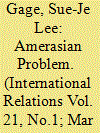

|
|
|
|
|
| Publication |
2007.
|
| Summary/Abstract |
The concept of 'mixed blood' is not a new one; however, it was not until 1982 that an unprecedented policy entitled 'The Amerasian Act' was created by the US government. Focusing on the author's ethnographic fieldwork in South Korea and the US, this article will unpack the assumptions underlying the seemingly religious statement 'the American thing to do' in terms of US policy, where ostensibly scientific notions of 'race', blood and identity are employed
|
|
|
|
|
|
|
|
|
|
|
|
|
|
|
|
| 2 |
ID:
077214
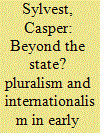

|
|
|
|
|
| Publication |
2007.
|
| Summary/Abstract |
The relationship between pluralism and internationalism is an interesting historical theme on the borderline between international relations and political theory. Intuitively the two ideologies seem to enjoy a close relationship, and at an abstract level they were both concerned with achieving political order with a minimum of central authority. However, the historical and theoretical interconnections between pluralism and (liberal) internationalism in Britain remain largely unexplored. This article attempts to fi ll this lacuna in intellectual history. Although both took shape within the confines of the same progressive intellectual agenda, the article strikes a cautious note about establishing too close a link between pluralism and internationalism, especially in the years following the Great War. This sceptical conclusion reflects not only the different preoccupations and changing nature of both pluralism and internationalism in the opening decades of the twentieth century, but also their complex theoretical relationship.
|
|
|
|
|
|
|
|
|
|
|
|
|
|
|
|
| 3 |
ID:
077212
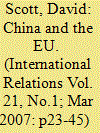

|
|
|
|
|
| Publication |
2007.
|
| Summary/Abstract |
The EU-China relationship is now emerging as a significant feature of the international system. The EU's institutional consolidation, development of supranational trade power and the foreign policy openings of the Common Foreign and Security Policy (CFSP) has entwined with the PRC's ongoing sense of geopolitical manoeuvrings between the superpowers. With its talk of 'multipolarity', grand strategy has converged, though the PRC's stress on 'multipolarity' can perhaps be distinguished from the EU's stress on 'multilateralism'. Nevertheless, human rights issues apart, the EU-China relationship has matured in the last two decades to involve significant economic matters and visions of a wider 'strategic partnership', bringing with it a challenge to American unipolar unilateralism
|
|
|
|
|
|
|
|
|
|
|
|
|
|
|
|
| 4 |
ID:
077213
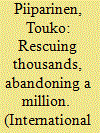

|
|
|
|
|
| Publication |
2007.
|
| Summary/Abstract |
The conceptual analysis of an 'emancipatory intervention', one that frees the people from repressive or genocidal political forces, has attracted scant attention in the debate on international relations. This has been partly due to the fact that the term has been hijacked by the pervasive liberal moral hubris which advocates greater missions1 under the guise of humanitarian intervention. This article aims to revive and reformulate the idea of emancipatory intervention by deriving lessons from Rwanda as an empirical case and by invoking humanitarian realism, which has the potential to move the vision of emancipatory intervention away from liberal interventionism. The 'new yardstick' of assessing emancipatory intervention is less ambitious, but more realistic: it is understood as the extent to which the intervening side might free itself from structural constraints in order to conduct a humanitarian intervention. In the Rwandan case, such possibilities specifically refer to structural cohesiveness, namely the capacity of the UN system to work efficiently when its powers are combined. They include not only the material powers of individual member states, as the mainstream literature has argued, but also rational-legal powers possessed by the UN Secretariat as well as control mechanisms. On this basis, the article constructs a vision of a 'hammer and anvil'peacekeeping operation in Rwanda.
|
|
|
|
|
|
|
|
|
|
|
|
|
|
|
|
| 5 |
ID:
077216
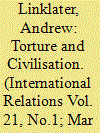

|
|
|
|
|
| Publication |
2007.
|
| Summary/Abstract |
The global anti-torture norm has been one of the main examples of a global civilising process. It refl ects modern sensibilities to cruelty and excessive force which were highlighted in Norbert Elias's account of the 'civilising process'. The idea of defending civilisation has also been used to defend torture in the war against terror. Exceptional methods are needed, it has been argued, to protect civilised ways of life. Notions of constitutional or 'civilised torture' have been introduced to try to harmonise these competing views. They have been employed in the attempt to reconcile civilised self-images with the use of excessive force. The future role of torture in the 'war against terror' depends on the interplay between these competing conceptions of the civilising process
|
|
|
|
|
|
|
|
|
|
|
|
|
|
|
|
| 6 |
ID:
077211
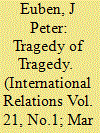

|
|
|
|
|
| Publication |
2007.
|
| Summary/Abstract |
There are good reasons to consider tragedy, especially Greek tragedy, a resource for current debates in international relations. This is not only because of the ethical and political dilemmas tragedy explores with such dramatic force, but because tragedy is a significant context for reading Thucydides with the political and literary acumen he demands. To ignore this context is to domesticate the ways tragedy challenges both our conventional readings of Thucydides as well as our substantive views of politics and the ways we study it. While this article fully supports the enterprise of invigorating classical realism with the study of tragedy and of posing the question, 'What can a tragic sensibility contribute to our understanding of international politics?', it makes that enterprise and that question more rather than less problematic. But it does so in the name of Greek tragedy and for an ultimately more challenging appropriation of it.
|
|
|
|
|
|
|
|
|
|
|
|
|
|
|
|
| 7 |
ID:
077210
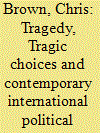

|
|
|
|
|
| Publication |
2007.
|
| Summary/Abstract |
The essence of the tragic vision of the world is that human action sometimes, perhaps often, involves a choice between two radically incompatible but equally undesirable outcomes: that whatever we do in a given situation we will be, from one perspective, acting wrongly. This account of the human condition may be particularly germane to realist thought, but the absence of a sense of the tragic can be employed to critique many other areas of international political theory. Analytical political theory in general rejects the tragic vision, and a great deal of modern writing on humanitarian intervention and global distributive justice similarly refuses to accept that sometimes there are no unambiguously right answers; that to act is, necessarily, to do wrong. The unwillingness to admit the tragic dimension of human existence is not simply intellectually harmful but also politically debilitating
|
|
|
|
|
|
|
|
|
|
|
|
|
|
|
|
|
|
|
|
|